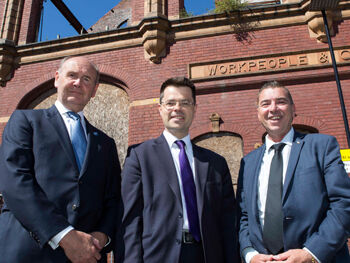University News Last updated 03 July 2018

Housing, Communities and Local Government Secretary the Rt. Hon James Brokenshire MP has today (Tuesday 3 July) unveiled new plans which will see a historic part of Birmingham’s Eastside regenerated to provide new facilities for businesses, artists and academics.
The Secretary of State formally announced Phase Two of Birmingham City University’s STEAMhouse project during a visit to the second city today.
The £60m plan will see Birmingham’s derelict Belmont Works, originally built in 1899, restored to its former glory as part of a major overhaul. £14million of funding has been provided by the Department for Business, Energy and Industrial Strategy, with £1million Local Growth Funding from GBSLEP. It is anticipated STEAMhouse will help create up to 10,000 jobs across the West Midlands region and help support the growth of the Midlands Engine.
The Grade A listed building on Cardigan Street has stood derelict since being gutted by a fire in 2007 but will now be transformed to house STEAMhouse’s permanent home. This will provide additional facilities and spaces for SMEs, as well as a new home for the University’s School of Computing, transforming the student experience for computing and digital technology students.
The Victorian Belmont Works factory served as the headquarters for the historic Eccles Rubber and Cycle Company and has since been used to produce linen clothing, bedsteads and pianos.
Work will see the building receive an extension to its rear façade to provide upgrades and new spaces, but the building will also retain many of its original features.
The Rt Hon James Brokenshire MP, Secretary of State for Housing, Communities and Local Government, said: “The STEAMhouse project is a fantastic example of how government investment is creating new jobs and boosting growth across the West Midlands.”
Andy Street, Mayor of the West Midlands, said: “STEAMhouse is a brilliant example of our Local Industrial Strategy in action, bringing together creative innovators from different sectors, and creating the leaders of the future right here in the West Midlands.
“Birmingham City University is a global leader in these fields, and the next phase of STEAMhouse will provide further facilities to expand this vital work.
“As we seek to bring Channel 4 to the West Midlands, this milestone in the STEAMhouse programme demonstrates our existing expertise and our ongoing commitment to the creative industries here in the region.”
Professor Julian Beer, Deputy Vice-Chancellor at Birmingham City University, said: “I am delighted to unveil our plans to develop STEAMhouse Phase Two and transform the historic Belmont Works building. STEAMhouse Phase Two will provide space for talented and innovative people from across academia, business and civic society to come together and develop ideas and products that change the world.
“This marks the continuation of the University’s commitment to the regeneration of the Eastside district of the Birmingham. I am particularly pleased that we have the backing of Government for a project that supports economic growth in the West Midlands.”
The development continues the University’s transformation of the Eastside district of Birmingham and follows a programme of investment worth over £260 million to develop state-of-the-art facilities for students and staff. In addition to the STEAMhouse Phase Two project, the University has acquired three plots of land adjacent to the existing City Centre Campus. Long-term plans for these sites will be developed in due course, with the University having applied to the City Council to temporarily use the sites for staff parking.
Once complete, Phase Two will boast a range of state-of-the-art equipment for businesses, artists and academics to take advantage of and help cement Birmingham’s reputation as one of the country’s leading start-up hotspots.
STEAMhouse’s development is in part a response to a range of reports which indicate that small businesses across the West Midlands are lagging behind on collaborative innovation.
The announcement follows the opening of STEAMhouse Phase One in Digbeth High Street in May 2018. The collaboration between Birmingham City University and Eastside Projects was formally launched by West Midlands Mayor Andy Street.
Based in the former car showroom on Digbeth High Street, Phase One of STEAMhouse features a range of new state-of-the-art facilities which people can access for free, ranging from 3D printers and laser cutting machinery to virtual reality technology and printing studios.
Set over six different rooms each space boasts its own specialist technology – much of which is unique in the region - and is equipped with dedicated technicians to support entrepreneurs in their ventures. By linking academic research and the vibrant creative arts scene in Digbeth, the University hopes to develop a new supply chain across the region.
Tim Pile, Chair of Greater Birmingham & Solihull Local Enterprise Partnership (GBSLEP), said:
“We welcome this latest milestone in Birmingham City University’s STEAMhouse project, which will create new jobs, develop new skills and drive economic prosperity throughout Greater Birmingham and Solihull. It builds on the great work of the project’s first phase, housed on Digbeth High Street, to put the region at the forefront of global innovation and creativity.
“Greater Birmingham and Solihull leads the way in sectors including advanced manufacturing, life sciences, and low carbon, digital and creative technologies. Our funding for the second phase of the development will help to bring together academia and industry in a historic, state-of-the-art facility to progress exciting new ideas and create long-term, sustainable growth.”
Businesses can now sign up to get involved with STEAMhouse by visiting www.STEAMhouse.org.uk.
STEAMhouse has received funding from the Government, the European Regional Development Fund and Arts Council England.